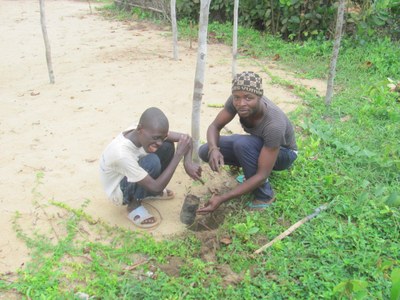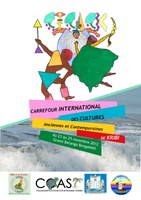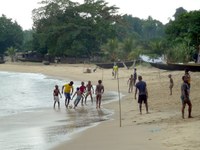Working Towards a Shared Vision for Sustainable Coastal Tourism in Kribi, Cameroon
Background on the COAST Project in Kribi, Cameroon
Figure 3: Map of the Kribi Demo Site.
The Sustainable Coastal Tourism Project in Cameroon has been in execution in Kribi since 2011, as the national demonstration project of the COAST Project executed by the Ministry of Environment, Protection of Nature and sustainable development (MINEPDED). The tourism component of the project is executed by the Ministry of Tourism and Leisure (MINTOUL in partnership with the UNWTO’s Sustainable Tourism Eliminating Poverty (ST-EP) Initiative, thanks to a generous contribution from the UNWTO ST-EP Foundation. The Kribi Demo Site has three areas namely Londji, Lobe Falls and the Grand Batanga.
Kribi is the main town within the Demo Site and is the Capital of the Ocean Division, an administrative region in the Southern Part of the country with an estimated population of 83 243, (according to the 2010 census statistics). Kribi is Cameroon’s main tourist destination renowned for its white sand beaches, hence tourism is one of the most important economic activities in the region. The Demo Site area currently boasts of many emerging tourism activities with white serene beaches, waterfalls, mangroves, and wildlife reserves based on the rich natural resources of the region such as marine turtles. It is also leading the way in marketing Cameroon’s nascent conference tourism by providing venues for seminars and workshops.
 Another feature that characterizes the Kribi area is the rapid industrialization of the city and, more particularly, in the Ocean Division. Currently, the Demo Site area is at the centre of many industrial, agro-industrial and transport projects. For instance, there is a regional deep sea port complex currently under construction. Together with rapid urban growth and development of the transport network, all these factors are contributing to increased pressure on the coastal and marine ecosystems. Hence the COAST Project team in Kribi is grappling with the challenge of making tourism and industrial development compatible in the area.
Another feature that characterizes the Kribi area is the rapid industrialization of the city and, more particularly, in the Ocean Division. Currently, the Demo Site area is at the centre of many industrial, agro-industrial and transport projects. For instance, there is a regional deep sea port complex currently under construction. Together with rapid urban growth and development of the transport network, all these factors are contributing to increased pressure on the coastal and marine ecosystems. Hence the COAST Project team in Kribi is grappling with the challenge of making tourism and industrial development compatible in the area.
Some of the environmental challenges in the area include:
- Coastal erosion aggravated by human activities such as sand digging, deforestation;
- Increased urban pressure on the coastline;
- Industrial pollutants and risk of oil spills;
- Unsustainable management of natural resources;
- Absence of adequate sustainable management structures resulting from inadequate policy enforcement and absence of land-use management plans.
Showcasing COAST Project Activities in the Kribi Demo Site
- The COAST Project Working Towards a Better Londji through Eco-tourism
Londji is one of the Demo Site areas of the COAST Project in Kribi that is working to leave behind its reputation of a “dirty village” through the support of the COAST Project. It is now set to become the next Eco-tourism destination in Cameroon. Located 15 kilometers west of Kribi, Londji is the largest fishermen village and fish market in Cameroon. The village showcases a vast diversity of peoples and ethnic groups, as the dynamism of the fishing activity has attracted communities from throughout West Africa over recent the years. The community is heterogeneous but integrated.
 This bubbling activity gave Londji the name of “le petit port” (the little harbor) as many merchandises arrived to the country via this village. In the 1970s, Londji with its wide white sand beaches was appointed by the former President Amadou Ahidjo as a tourism development area. However, many years passed and little was done to see this to fruition. On the other hand, illegal activities, bad roads, and inappropriate waste management gave Londji a bad reputation. However, it remained with the tag as the “most beautiful bay of Cameroon” according to most international guides (Bradt, Petit Futé) but lost much of its appeal as a tourism destination.
This bubbling activity gave Londji the name of “le petit port” (the little harbor) as many merchandises arrived to the country via this village. In the 1970s, Londji with its wide white sand beaches was appointed by the former President Amadou Ahidjo as a tourism development area. However, many years passed and little was done to see this to fruition. On the other hand, illegal activities, bad roads, and inappropriate waste management gave Londji a bad reputation. However, it remained with the tag as the “most beautiful bay of Cameroon” according to most international guides (Bradt, Petit Futé) but lost much of its appeal as a tourism destination.
The COAST Project, aware that waste management and poor sanitation was a real risk for the health of Londji’s inhabitants, consolidated through regular participatory meetings a community group that took the responsibility of regularly cleaning the beach, and coordinating the development of new Eco-tourism products. The underlying idea was that “A clean environment keeps illness away and attracts tourists”, and it worked. The group recently received its agreement as a community tourism operator under the name of “Londji Eco-tourism Group”.
Additionally, the project works to foster ongoing conservation efforts of mangroves, and aims at creating tourism value through promoting sustainability products such as mangrove nature trails, walks and boat trips. The position of Londji as the main fishing harbor west of Kribi gives Londji a lot of potential as a departure point for sea boat trips to virgin unexplored beaches in the Lokoundje and Nyong estuaries. In an increasingly urbanized Kribi, this coast becomes an oasis of paradise with pristine beaches and wetlands, where manatees and dolphins can be spotted during some periods of the year. It is important to note here that, as envisaged by the COAST Project, the resultant partnership in project implementation helps the local community extract some real economic benefits from the touristic activities, and therefore promotes a relationship where the local community and the local industry have found a way to live and work in harmony with the environment. In addition, tourism activities are now taking place in a controlled sustainable way that is good for the environment but also for their economic activities and livelihoods.
The goal is to give tourists visiting Kribi a good reason to do an additional excursion, to stop in Londji to buy some fresh and smoked fish, or to simply relax on the now clean beaches. For this year, a number of activities have been planned by the COAST Project including some training on customer care and tourism handling for the staff of a number of hotels in the area.
- The COAST Project Inspires a Study to Monitor Changes in Coastal Areas in Kribi
The COAST Project work in Cameroon inspired an initiative by a team of researchers from the Polytechnic University of Madrid in Spain to develop and publish a paper titled, “Use of satellite images for monitoring changes in natural spaces of the coastline”. Our COAST Project team member, Mr. Santiago Ormeno, was part of the research team that co-authored this paper. This study shows that methodologies based on satellite images can be used successfully for monitoring environmental changes in coastal areas. The study was motivated by the realization that 48, 000 km of coastline in Sub Saharan Africa are threatened by the impact of development related activities. In the Kribi Demo Site area, tourism, fisheries, agro-industrial and port activities are competing for dominance in the context of rapid urbanization and industrialization. With a rich biodiversity of vulnerable habitats, it is important to integrate conservation principles in the area.
During the research, the team working in the field of geodesy (The science of measuring and monitoring the size and shape of the Earth including its gravity field and determining the location of points on the Earth’s surface (NOAA 2013) and remote sensing from the Polytechnic University of Madrid developed a technical methodology which produced some useful results for the monitoring and evaluation of changes occurring in the coastal strip. In this study, images from satellites Landsat 5 and 7 were used to obtain environmental indicators and biophysical parameters. The study indicates a reduction of nearly 50% of vegetation cover in the coastal strip from 1984 to 2010.
Higher intensity land-use changes were observed in the sector from Londji to Kribi, compared to those observed between Kribi and Grand Batanga. Two typologies of change have been identified; the ones resulting from the intensification of agricultural activities, and those due the expansion of the urban area and its communications network. The study concludes that methodologies based on satellite images can be successfully used for monitoring environmental changes in similar cases. The model presented has been used in the mentioned studies and have successfully been used by the authors in other areas. They also offer good potential for replication in analyzing the changes in coastal areas, and it is hoped that the results from this study will be up scaled and used to influence further actions by all the stakeholders in Kribi.

- The COAST Project supports Local Tree Planting Efforts in Kribi
Beaches in the Kribi coastline suffer from extreme coastal erosion resulting from changes in tides related to global warming. This erosion reduces the extension of beach shores and presents a real risk for the sustainability of coastal tourism activities in many areas of Kribi. These erosion problems are usually worsened by anthropogenic factors such as illegal sand digging activities and the rapid urbanization of the Kribi coastline, which entails deforestation and loss of vegetation cover. This exposes the adjacent lands to wind and marine erosion.
In cooperation with the National Agency of Forestry Development (ANAFOR), and the Kribi First City Council, the COAST Project in Cameroon launched a tree planting pilot initiative in the Demo Site of Bongahélé (Grand Batanga) in May and June 2012. The initiative received the name “One tree, one child”. Children from the local community planted over 235 trees donated by the Kribi FirstCity Council, individual tourists and local associations.
This exercise was conducted in cooperation with the Eco-tourism Group of Grand Batanga and endorsed by the village’s traditional chief. An educational forum about coastal erosion and how it affects livelihoods was also organized in cooperation with environmental NGOs (Model Forest, WWF). A second tree planting activity that attracted significant media coverage by the national TV was organized in June 2012. This activity served to extract valuable lessons regarding the technical requirements needed to carry out a tree planting activity on beach shores, such as the importance of choosing appropriate varieties, taking tides into account, the need of constant follow up in early stages, and the requirement of doing a good sensitization among communities, as trees are normally very easy targets for vandalism. In the long run, a number of tree nurseries should be established to enhance sustainability of such initiatives.
The COAST Project aims at extending this initiative to other villages in Kribi affected by coastal erosion, specifically in the Lobe Falls area. A larger proposal to include reforestation of beaches in Kribi will be considered by the Kribi City Hall in its upcoming board meeting.
Other COAST Project Activities in Kribi
- On September 21st and December 17th 2012, the COAST Project organized two workshops in Kribi to validate the sustainable tourism management plans drafted by the project and to review the planned environmental activities. More than 50 representatives from the community, government officials, and private sector participated in these meetings, whose main goal was to build a shared vision regarding development of sustainable tourism activities and development priorities in Demo Sites.
- The COAST Project and the Sustainable Coastal Tourism partners showcased Eco-tourism activities in the Grand Batanga Demo Site. The project also supported the 5th Edition of the International Cultural Crossroad Kribi festival, a cultural and touristic festival which year after year aims at becoming a “Crossroad of cultural exchanges among different countries and generations” in Cameroon.
- The Project partnered with the Campo Ma’an National Park Conservation Service and the Ebotour Marine Turtle Conservation initiatives in the Kribi region. Both Eco-tourism sites are based on the idea that tourism can support conservation efforts of endangered species (great apes and elephants in Campo Ma’an, and marine turtles in Ebodgé).
Conclusion
Some of the results emerging from the Kribi Demo Site clearly place the Site at a vantage position to drive the national plans for sustainable coastal tourism in Cameroon. The COAST Project investments in Londji, Grand Batanga and Lobe Falls, under the Sustainable Coastal Tourism Project, if sustained in the long run will result in improved ecosystems and biodiversity. In this way, the project is delivering on its objective of demonstrating and supporting adoption of best practice approaches for sustainable tourism that reduces the degradation of marine and coastal environments of trans-boundary significance. At the Kribi Demo Site, the ongoing activities are building partnerships that are helping the local community extract real economic benefits from the tourism industry. This has led to a relationship where the local community and the local tourism industry have found a way to live and work in harmony with the environment. In addition, tourism activities are now taking place in a controlled sustainable way that is good for the environment.
It is important to note here that by safeguarding the environment in the tourism industry at Kribi, sustainable livelihoods and incomes are being realized and are assured in the long run. While challenges associated with rapid urbanization and industrialization remain, further partnerships need to be fostered to ensure sustainability of these initiatives. For instance, the results from the study that monitored changes in the coastal area at Kribi would benefit immensely from concerted actions by all stakeholders, including private–public partnerships, to reduce the harmful impacts resulting from human activities in the coastal area. In this regard, increasing tourist numbers should not be allowed to negatively impact on the fragile ecosystems in Kribi, and this is at the heart of COAST Project at this Demo Site. This will go a long way in helping nurture a shared vision towards sustainable tourism in coastal areas in Africa.




















